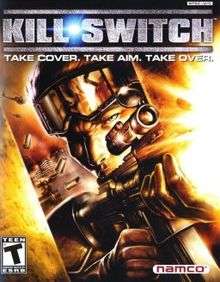Kill Switch (video game)
| Kill Switch | |
|---|---|
 | |
| Developer(s) |
Namco USA[1] Visual Impact (GBA) |
| Publisher(s) |
Namco Destination Software (GBA) |
| Designer(s) | Chris Esaki[2] |
| Programmer(s) | Gil Colgate |
| Writer(s) | Alvin Muolic |
| Composer(s) | Kevin Manthei |
| Engine | RenderWare |
| Platform(s) |
PlayStation 2 Xbox Windows Game Boy Advance |
| Release | |
| Genre(s) | Third-person shooter |
| Mode(s) | Single player, multiplayer |
Kill Switch (stylized as kill.switch) is a third-person shooter video game developed by Namco USA in 2003 for PlayStation 2, Xbox and Microsoft Windows. A Game Boy Advance adaptation was released in 2004. The GBA game was created independently of Namco, due to a licensing deal with Destination Software.[3]
The most distinguishing characteristic of Kill Switch is its cover system, a mechanic that has the player character taking cover behind objects and around corners in a manner similar to Namco's own Time Crisis series of light gun shooters as well as Koei's third-person shooter WinBack[4] and Hideo Kojima's stealth game Metal Gear Solid 2: Sons of Liberty.[5] However, Kill Switch was the first third-person shooter to feature the cover system as its core game mechanic, though Gears of War would popularize it.[6]
Story
Protagonist Nick Bishop (voiced by Marcus McCollum) is a super-soldier remotely controlled via direct neural connection by a man known only as "Controller" (voiced by Chuck McQuary) in a series of combat missions designed to bring "the North" and "the West" to war. Profiteer Archer (voiced by Adam Baldwin) plans to benefit by selling the technology used to control Bishop, who gives Controller headaches on recollection of suppressed memories featuring a woman and the phrase "Say my name". Moments before launching a biological warhead, Controller is killed by a surge triggered when a woman known as "Duchess" (voiced by Adrienne Wilkinson) seizes control of Bishop. Sent to attack Controller's base, Bishop's memories are eventually restored: the woman from his memories was his new wife, who Archer killed when he captured Bishop to sell the technology inside him. Freed, Bishop kills Archer in a final assault and walks away.
Reception

| Reception | ||||||||||||||||||||||||||||
|---|---|---|---|---|---|---|---|---|---|---|---|---|---|---|---|---|---|---|---|---|---|---|---|---|---|---|---|---|
| ||||||||||||||||||||||||||||
Kill Switch was regarded as having a thin plot and simplistic level design, but the gameplay mechanics such as the cover system were considered engaging. It was compared to the Time Crisis series. The Xbox version of the game was said to contain enhanced graphics over the PS2 version. GameSpot awarded the Xbox version a 6.9 out of 10.[12]
The GBA version of the game was similarly received, with IGN calling it a "solid portable action title" and awarding it a 7.5 out of 10.[3]
Legacy
Kill Switch is best remembered to be the first third-person shooters to feature a cover system as its core game mechanic,[6] and for introducing the blind fire mechanic to the cover system.[13] Several shooters took inspiration from Kill Switch and implemented similar cover systems. In the design of Gears of War, lead developer Cliff Bleszinski of Epic Games credits Kill Switch's cover system as one of the influences they put into the game's design,[14] as Kill Switch's lead designer Chris Esaki was employed by Epic Games and was involved in the development of Gears of War.[2]
Naughty Dog's Uncharted: Drake's Fortune, which began development in 2005 and was released in 2007,[15] also took inspiration from Kill Switch, which Uncharted's lead designers Evan Wells and Amy Hennig credited as inspiration for the game's cover system.[16] Other examples of shooters that featured Kill Switch-inspired cover systems include the 2005 third-person shooter CT Special Forces: Fire for Effect,[17] and the 2006 games Tom Clancy's Rainbow Six: Vegas,[18] a first person shooter released in the same month as Gears of War,[19] and Killzone: Liberation, an isometric shoot 'em up released a month before Gears of War.[4]
References
- ↑ "kill.switch". GameSpy. Retrieved June 30, 2018.
- 1 2 "Gears of War: Five Things You Didn't Know". TeamXbox. September 29, 2006. Archived from the original on September 28, 2011. Retrieved June 30, 2018.
- 1 2 Craig Harris (2004-10-01). "IGN kill.switch Review". Gameboy.ign.com. Retrieved 2011-07-06.
- 1 2 Brian Ashcraft (January 20, 2010). "How Cover Shaped Gaming's Last Decade". Kotaku. Retrieved 2011-03-26.
- ↑ Lindsay, Stuart (2009-12-02). "Did Gears of War Innovate the Cover System". Planet Xbox 360. Archived from the original on February 16, 2009. Retrieved 2009-12-12.
- 1 2 "Why Vanquish will make Gears Of War obsolete". Play. July 19, 2010. Retrieved June 30, 2018.
- ↑ "kill.switch for Xbox". GameRankings. 2003-10-28. Retrieved 2011-07-06.
- 1 2 3 4 5 "kill.switch Reviews and Articles for Xbox". GameRankings. Retrieved 2011-07-06.
- ↑ Gerstmann, Jeff (2003-10-28). "kill.switch Review, kill.switch PlayStation 2 Review". GameSpot.com. Retrieved 2011-07-06.
- ↑ "kill.switch - PS2 - Review | GameZone.com". Xbox.gamezone.com. Archived from the original on 2011-08-07. Retrieved 2011-07-06.
- ↑ Jeremy Dunham (2003-10-27). "kill.switch - PlayStation 2 Review at IGN". Ps2.ign.com. Retrieved 2011-07-06.
- ↑ Gerstmann, Jeff (2003-10-28). "kill.switch Review, kill.switch Xbox Review". GameSpot. Retrieved 2011-07-06.
- ↑ "Kill.Switch & Gladius Go Gold". IGN. October 6, 2003. Archived from the original on July 5, 2011.
- ↑ "GDC 07: Cliffy B disassembles Gears, mentions sequel". GameSpot. March 12, 2007. Retrieved 2007-07-05.
- ↑ Randolph Ramsay (2007-10-26). "Q&A: Naughty Dog on Uncharted". GameSpot AU. Archived from the original on 2011-09-20. Retrieved 2008-08-11.
- ↑ "Uncharted: Drake's Fortune Afterthoughts". 1UP.com. January 10, 2008. Archived from the original on January 21, 2012. Retrieved June 30, 2018.
- ↑ "CT Special Forces Fire For Effect Review". VideoGamer.com. April 24, 2005. Archived from the original on September 27, 2012. Retrieved June 30, 2018.
- ↑ "Tom Clancy's Rainbow Six: Vegas 2 – Review". Game Critics. July 17, 2008. Archived from the original on November 21, 2008. Retrieved June 30, 2018.
- ↑ "Tom Clancy's Rainbow Six Vegas Review". GameSpot. Archived from the original on December 6, 2006. Retrieved June 30, 2018.